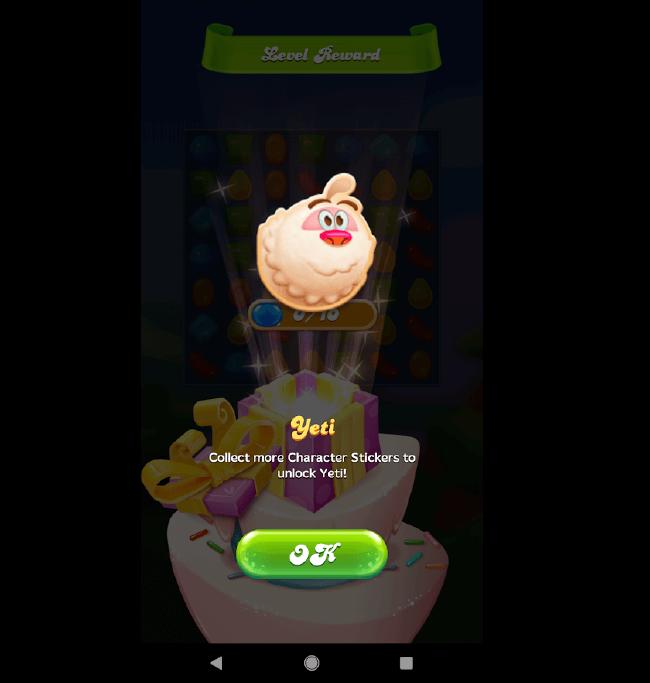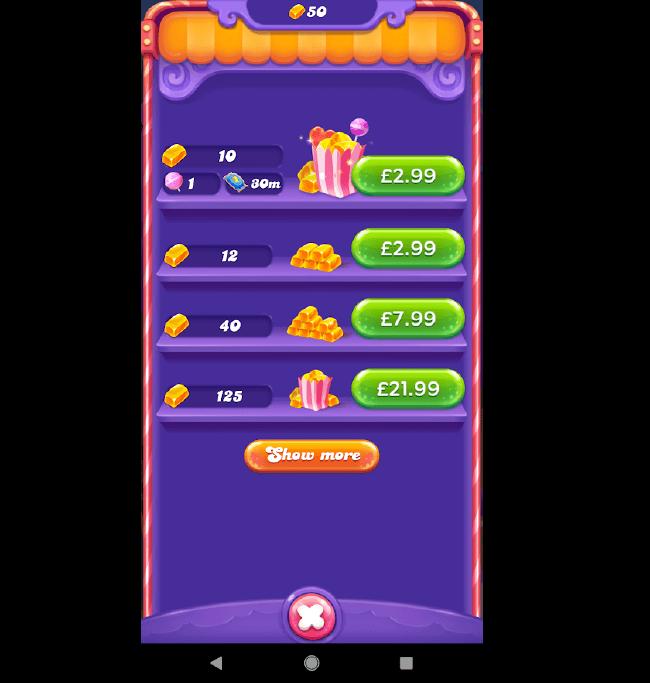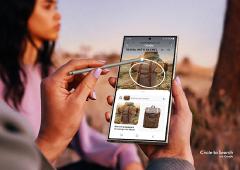Categories
Playing Candy Crush Friends Saga is a dangerous game
9 minute read
I’ve been an avid gamer for years, so it frustrates me when I see a heavily monetized app like Candy Crush Friends Saga being masqueraded as a real game. I love smartphones and I’m a big fan of good mobile games, but to me, I’ve never considered the Candy Crush series a true gaming experience. Before I share my opinion on why, I wanted to give the new Candy Crush Friends Saga the benefit of the doubt. I played it and tried to understand the appeal of it.
My first impressions on Candy Crush Friends Saga

I started this topic with the intention of doing a new review on Candy Crush Friends Saga. It was trending and seemed like a great opportunity for a good review style article. From my experience, I found Candy Crush to be a free game series that’s light-hearted, easy to get into, and offers quick fun in short bursts. It’s the perfect mobile game experience that doesn’t take much thinking or preparation, so I see why it’s such a success.
Candy Crush Friends Saga, in particular, feels like a great refresh. The game has been filled with all sorts of cute characters that can be unlocked, far better 3D animations, and hundreds of levels to play through. The trouble is, the mindset of the developers and their approach with Candy Crush Friends Saga is something I’m not too pleased about. As I started to play Candy Crush Friends Saga for longer, I felt a little uncomfortable with what I was being subjected to. The first impression I got from Candy Crush Friends Saga reminded me of the time I spent an afternoon in an arcade as a young boy.
All of the bells and whistles are flashing in your face, sending signals to your brain that it’s all fun and excitement. As I’ve gotten older, I’ve seen arcades essentially as kiddified casinos. Both are fun and mindless in essence, and for the average player there’s no real harm to either. But those running arcades and casinos use very scary tactics to draw new players in and keep them there. And that’s where it hit me - the number of similarities between Candy Crush Friends Saga and real, addictive slot machines, the kinds you see both in pubs and online, is incredible.
Likewise, the similarities between the practices a casino owner and developers like King make, are in the same vein.
Tactics the Candy Crush Makers Use to Get You Spending Money

You might think I’m maybe taking this a bit far, but I’m not the only one to notice these similarities. Take this article by the Guardian for example, aptly titled ‘This is what Candy Crush does to your brain’. Or how about this great piece called ‘The Ethics of the Candy Crush Pusher’, published on The Atlantic?
Both articles share my thoughts on the potentially addictive nature that King has pushed into their Candy Crush games. In Candy Crush Friends Saga, you’re slowly pulled in with easy levels that take nothing but a few mindless swipes to complete. You’re rewarded with large words like “Sweet!, “Divine”, and “Delicious!” popping up on the screen. If you complete a level, your remaining moves turn into power ups that cause excitement and havoc in front of you.
At the end of each level, you’re rewarded a score and ranked amongst your friends. If you don’t have any friends that play, King will give you fake friends to fight against instead. You are given this very mild sense of satisfaction. It’s not incredibly exciting, yet you find yourself swiping, swiping, swiping away and it’s hard to understand why.
King, the developers behind this, aren’t strangers to this phenomenon. It’s called gamification. It’s a technique used to make you feel good about playing their game. There doesn’t need to be any sense of skill or strategy involved. Instead, you’re slowly drip fed small dopamine hits that give just enough satisfaction to keep you playing. To keep you going for longer, they dangle more small rewards in front of you. In Candy Crush Friends Saga, this includes new characters to play as, new costumes, or big rewards for getting to the end of a trail of levels.

Now, if this was just a free game with no in-app purchases tied to it, you could argue that it’s all fine and dandy - just like any game, it’s down to the player’s responsibility to know when to put the game down. This is true, but King, and many other developers like them, slowly start to make winning less predictable and ultimately more difficult as you progress through their games. If you can’t complete a level, you’ll lose a life. Run out of too many lives in a short period, and you’re forced to wait or spend money to get more lives.
Alternatively, you can spend money to get extra power-ups to get past the levels with ease. The trouble with this whole system is that King expertly tie their gamification into their monetization. By this I mean they expect you to get mildly attached to the wins and rewards that get thrown your way, and then they just nudge them ever so slightly out of reach. And by ever so slightly, I really mean it. It’s as if the levels are designed to make you feel like if only you had one or two more moves, or another power-up, you’d be able to get past it.
This feeling incites frustration in the player and it spurs them to keep playing. In gambling it’s called a near miss, and many studies have been done on its effect on the brain. This study shows how the same near miss feeling in Candy Crush gives off a very similar effect. Even though there’s no money to be won, the same signs and signals are there to lull you into addiction.
There’s been lots of research on this and it’s why there are so many regulations on gambling in the first place. Yet, there are no regulations on casual games like Candy Crush. To me, the potential for addiction seems just as strong. Examples of players feeling a sense of regret for spending money on mobile games when they shouldn’t is well documented.
Regulations should exist to stop rampant spending in casual games

For the average player who may use Candy Crush to wind down after a long day, what’s the easier option? Spending £2.99 on a quick power up so that they can get back to their current favourite life distraction? Or, get frustrated with the level because no matter how hard they try it just doesn’t want to give in and let them win?

This whole issue with monetization in mobile games has been something that’s bugged me for a long time. I just haven’t quite had the right words to explain it until now. Now that Candy Crush Friends Saga is launched and I’ve given it a whirl for myself, I feel a renewed sense of frustration for the current market we live in.
Honestly, I’d like to see some kind of regulation on casual games like Candy Crush. Gambling regulation is a very serious thing, especially in the UK. If it’s possible to get addicted to a game like Candy Crush Friends Saga, why aren’t there systems in place to help players? Google and Apple should create systems that let players set up payment limits so that players don’t fall into spending more money than they can afford to lose.
Developers like King should also be held responsible and should give players tools to turn off transactions, limit them, or provide informative details about how much they are spending. This is obviously a bigger beast than any one of us can solve independently, but the good news is that we are seeing some progress. Last year, Star Wars Battlefront 2 got a lot of bad press for pushing similar microtransaction practices. It brought about a discussion similar to this that argues that there should be regulations on such items in video games.
To me, Candy Crush’s case is even worse than Star Wars. For Candy Crush, to me, it feels like the entire game is based around trying to coerce you into spending money. In fact, their recent purchase of analytics firm Omniata suggests that King will go very far to entice players to spend money. Quoted from the article linked above [King] “Targets those who pay or don’t pay with different kinds of incentives to encourage them to spend more. Omniata is one of the companies that helps game companies figure that out.”
Why Candy Crush sets a bad example for first time gamers

So besides being a front to pull money from players, is Candy Crush actually a real, enjoyable video game? Whilst many people enjoy Candy Crush and the majority of players may not even spend a penny, the experience you get is a restricted video game suffocated by monetized roadblocks from the developers. At first glance, Candy Crush is fun and mostly harmless, but I can’t happily give it a good review without making these points.
I know for a fact that there are so many other great options out there on the app store, some of which are free, too. If you like playing Candy Crush, I’d highly recommend taking a search in the app store for better options. Good video games have always been a great part of mine and many others lives. I still remember the first time I played video games with my brothers and how much I enjoyed it. That for me will always be one of my best memories. It upsets me when I see that a person’s first introduction to gaming is Candy Crush or any of the multitude of other monetized free mobile games when I know what incredible games are out there. There’s so much else out there that can offer free you fun and entertainment.
If you would like to give Candy Crush Friends Saga a try, you can find it on both Apple and Google Play through the links provided below.
Candy Crush Friends Saga on Android Candy Crush Friends Saga on iPhone





